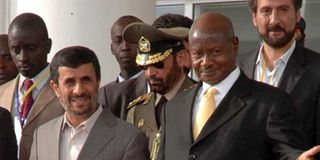UN sanctions affect Shs92b Iranian grant

BONDING: Presidents Museveni (R) and Ahmadinejad in April in Kampala. PHOTO BY ISAAC KASAMANI
Uganda cannot get a Shs92 billion grant from Iran because of international sanctions imposed on the Middle Eastern country. The revelation is contained in a Foreign Affairs Ministry submission to the parliamentary Public Accounts Committee in which PS James Mugume said the UN sanctions were making it hard to get the money.
‘‘The ministry has followed up the implementation of this credit (Shs92b). However, it has faced challenges especially following the imposition of sanctions on Iran,” read the memo dated August 16.
‘‘In a bid to overcome the difficulty in transferring funds to and from Iran because of sanctions, and promote investment and trade, the two countries (have) agreed on the establishment of a bank as a joint venture as the best way forward.”
A senior official in the ministry told Daily Monitor yesterday that the grant in question had been increased from $10 million (about Shs20b) to $46m (about Shs92b) following a visit of Iranian President Mahmoud Ahmadinejad to Uganda in April this year.
The bank venture, besides being able to utilise the money, will also focus on other commercial activities. Ambassador Mugume yesterday told Daily Monitor that the bank, MIDSOC, will have to meet all requirements needed of a financial institution by Bank of Uganda.
He added that the Central Bank will also conduct a background check to confirm that the bank is not among those blacklisted by the international community.
The UN Security Council has between 2006 and 2008 imposed sanctions against Tehran over its continued failure to suspend its uranium enrichment activities. The UN on June 9 passed a resolution calling for sanctions against new Iranian banks abroad as well as vigilance over transactions with any Iranian Bank, including the Central bank.
By offering support to Uganda, the Iranian leader was seen as trying to rally support for his country’s nuclear programme, which some Western nations say is aimed at building weapons - a an accusation Tehran denies.
President Museveni has since defended the right of every country to pursue nuclear technology for peaceful purposes. However, Uganda, which is a non-permanent member of the council, voted in favour of the Iran sanctions.
Over the years, Uganda has been increasing its ties with Tehran. After a state visit to Iran last year, President Museveni announced that Iran had agreed to assist Uganda in the construction of an oil refinery. Iran also agreed to help train Ugandans in petroleum studies.
The move by the UN is also likely to affect the planned establishment of a Free Trade Zone in Njeru Town, another Iranian intervention in Uganda. The government has since obtained land at Namanve Industrial Park for the project.
For discussion
The matter is expected to be discussed with PAC as part of the 2007/8 audit queries in which the Auditor General questioned Foreign Affairs Ministry over delays in following up on various international pledges.
State Minister for International Affairs Okello Oryem was unavailable for comment on the matter as he was reportedly busy, while Mr Mugume would not pick his phone.




